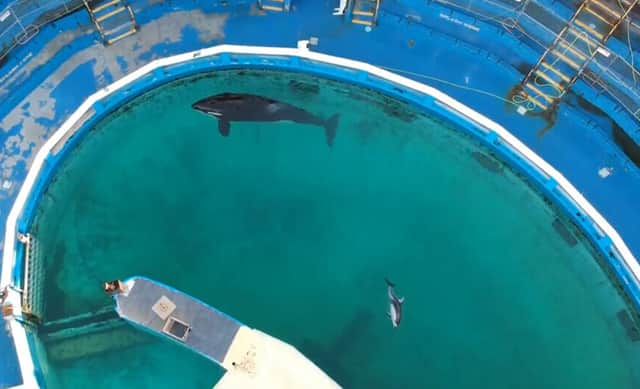Lolita the orca: activists condemn Seaquarium sending orca's only companion to SeaWorld - instead of sanctuary
Li'i the Pacific white-sided dolphin was Lolita the orca's only companion, up until her death last month
and live on Freeview channel 276
A US aquarium has been accused of condemning a dolphin which spent years as Lolita the orca's only companion to spend the rest of his life in "yet another concrete cell".
Last month, Lolita – formerly known as Tokitae, or Toki – an orca housed at Florida's Miami Seaquarium, died from suspected kidney problems after more than half a century in captivity, on the brink of plans to move her to an ocean sanctuary. The orca had controversially lived in a 24-by-11-metre tank, which was about six metres deep, for years - considered by many welfare advocates to be dirty and far too small for her.
Advertisement
Advertisement
The park's new owner - The Dolphin Company - and the Friends of Toki non-profit announced a plan in March to possibly move her to a natural sea pen in the Pacific Northwest, with the financial backing of Indianapolis Colts owner Jim Irsay, but she died before this came to pass.
However, US animal rights group PETA has criticised the Seaquarium for not returning her only companion, a Pacific white-sided dolphin named Li'i, to the sea, instead transferring him to another marine theme park facility - SeaWorld San Antonio.


In a statement sent to NationalWorld, PETA's executive vice president Tracy Reiman said by not sending Li'i to a seaside sanctuary, the Miami Seaquarium was "condemning him to spend the rest of his life in yet another concrete cell".
"The Miami Seaquarium has failed this long-suffering dolphin, just as it failed Lolita, she continued. Li’i deserved the chance to return to his ocean home, she said, "to explore, dive, and finally feel some sense of freedom after nearly 35 years spent in a chlorinated concrete tank".
Advertisement
Advertisement
PETA urged the Seaquarium to give the dolphin "the peaceful oceanic retirement he is owed" and send him to a seaside sanctuary, such as the one originally planned for Lolita.
In a statement on Facebook, Miami Seaquarium confirmed Li'i had been moved to SeaWorld San Antonio, in Texas. "After 35 years under the care of Miami Seaquarium, Li’i, our last Pacific white-sided dolphin, who spent the last years with our beloved Lolita, was successfully moved to SeaWorld in San Antonio, Texas, to a habitat with other dolphins of his same species," a spokesperson wrote.
"After the departure of Lolita, our animal care experts suggested his relocation to a habitat with other peers of his species and our efforts to look for his well-being took him to SeaWorld in San Antonio.
"Although we will very much miss him, we feel happy to know this is the best for him. Thank you to all the team from Miami Seaquarium and The Dolphin Company for making this possible and thank you to all the people who always expressed their interest in Li’i’s welfare, just as we did," the statement continued.
Advertisement
Advertisement
Less is known about Li'i than his famous tankmate, Lolita. The male Pacific white-sided dolphin is thought to be about 40 years old - and was also believed to have been wild caught, and to have performed in shows in the past. He has been in captivity at least 35 years.
His new tank is thought to be a substantial improvement to his living conditions. Local media report he will be moved to a 2.5 million-gallon cold water habitat with other dolphins of the same species.
Lolita was caught in the wild as a young orca - just four years old - from the Pacific Ocean near Seattle in August 1970. She has been in captivity at Miami Seaquarium since September 1970, more than 50 years.
The orca had performed in live shows until 2022, Euronews reports. Marine mammal entertainment shows are controversial, particularly those involving orcas, with animal welfare activists concerned about the long-lived, highly intelligent mammals spending decades confined to small enclosures - in defiance of their natural tendency to swim great distances.
Comment Guidelines
National World encourages reader discussion on our stories. User feedback, insights and back-and-forth exchanges add a rich layer of context to reporting. Please review our Community Guidelines before commenting.
